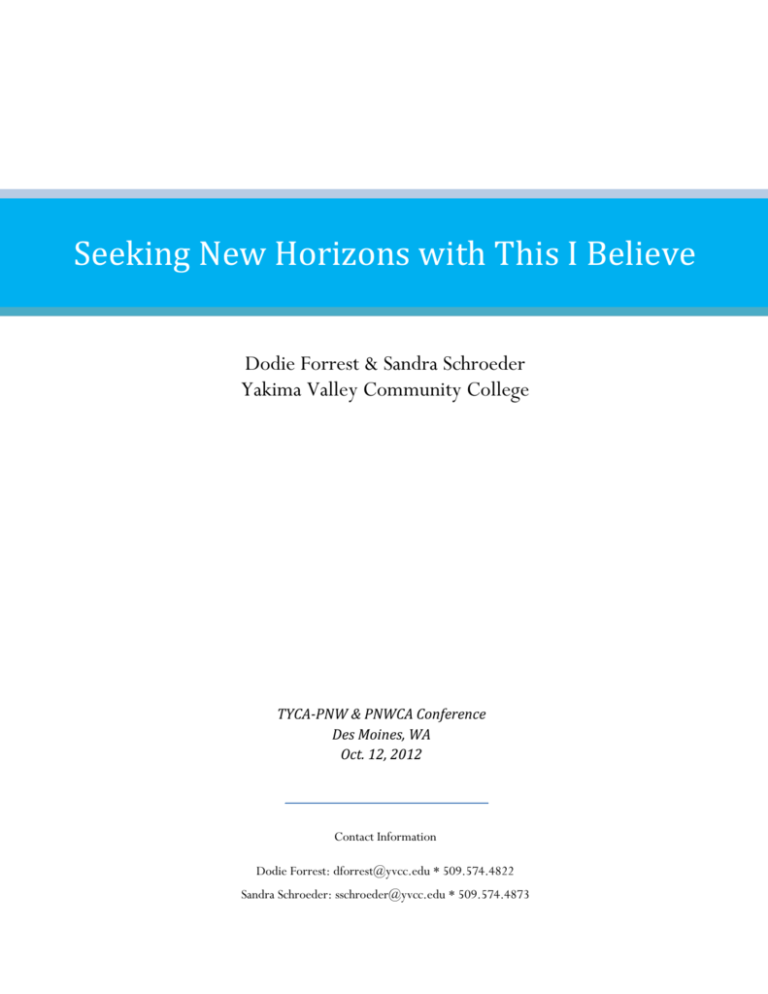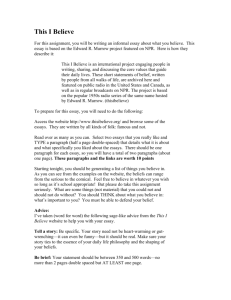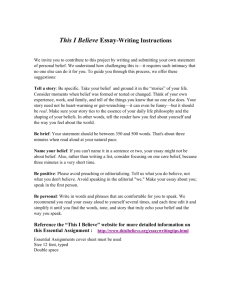
Seeking New Horizons with This I Believe
Dodie Forrest & Sandra Schroeder
Yakima Valley Community College
TYCA-PNW & PNWCA Conference
Des Moines, WA
Oct. 12, 2012
Contact Information
Dodie Forrest: dforrest@yvcc.edu * 509.574.4822
Sandra Schroeder: sschroeder@yvcc.edu * 509.574.4873
Introduction
What follows is a set of assignments we have used in two developmental writing courses
(English 090 and English 095 at our college) over the last year based on the NPR This I
Believe radio series and anthologies. The community dialogue about beliefs along with
personal stories shared in the classroom, in the print anthologies, and on the website have
proven to be popular with our students and make for an engaging curriculum in a writing
course.
Thisibelieve.org provides a variety of resources to aid instruction—including audio
recordings of writers reading their essays and extensive curricula that may be downloaded
for a donation of $15.
We offer but a sampling that draws from some of the assignments downloaded from the
website as well as assignments that are our own creations. The Belief Questionnaire, for
instance, makes a great icebreaker on the first day of class—getting students to talk about
beliefs and share stories right away. Other assignments might be used for in-class writing
exercises or more fully developed essays.
Perhaps some of this material will appeal to you. Feel free to you use a single assignment
or the whole set, and let us know if your students enjoy and benefit from it as much as ours
have.
Sincerely,
Dodie and Sandy
Belief Questionnaire
What Do You Think?
In the space in front of each belief statement, write an “A” if you agree or a “D” if
you disagree.
______ Life is fair.
______ Words can hurt.
______ What goes around comes around.
______ How you act in a crisis shows who you really are.
______ Love conquers all.
______ An eye for an eye . . .
______ People learn from their mistakes.
______ You can’t depend on anyone else; you can only depend on
yourself.
______ If you smile long enough, you become happy.
______ Miracles do happen.
______ There is one special person for everyone.
______ Money can’t buy happiness.
______ Doing what’s right doesn’t just mean obeying the law.
This I Believe High School Writing Curriculum, ©Copyright 2005–2011, This I Believe, Inc.
All rights reserved. Permission to reproduce or copy, in full or in part, is granted for classroom use only.
All other usage is permitted only with prior written permission.
Show Me the Money...or at Least the Story that Makes It Real
Choose a belief that is common to all group members. Record your common belief
in the space below. Then each member of the group should tell a story that either
shows the belief in action or explains why the storyteller believes what (s)he does.
Belief Statement:
______________________________________________________
Story from ______________________
Group member name
Story from ______________________
Group member name
Story from ______________________
Group member name
Story from ______________________
Group member name
This I Believe High School Writing Curriculum, ©Copyright 2005–2011, This I Believe, Inc.
All rights reserved. Permission to reproduce or copy, in full or in part, is granted for classroom use only.
All other usage is permitted only with prior written permission.
Prompts to Explore in a Journal or Writer’s Notebook
Directions: Reflect on any one of these prompts for 10 minutes.
1. Everyone has problems or challenges to overcome in life. What has been the
most challenging or rewarding moment in your life?
2. Have you ever been in a situation when you didn’t quite have the courage to
take action when you felt you should?
3. Did you ever have to confront someone very different from you? If so, what
happened? What did you learn?
4. Have you ever been disappointed because someone made you a promise that
they failed to keep? Or have you broken a promise that you made to
someone else?
5. Can you think of someone who has taught you a valuable lesson about life?
Can you remember the exact moment when that lesson occurred?
6. Have you ever had a “do something” moment—a time when you realized
you had to take action in order to make a change happen?
7. Have you ever changed your mind about something that you were
previouslycertain about? What was the moment that led to this change?
8. What do you believe are the most important “rules to live by”? When did
you learn those rules, and who taught you? Choose one of those rules to
explore more in depth.
9. We all tend to judge people by their appearances, even though looks can be
deceiving. Have you ever prejudged someone incorrectly based on
appearances, or has someone ever prejudged you unfairly based on how you
look?
10.Finish this sentence: “If there’s one thing I’ve learned about life, it is . . .”
This I Believe High School Writing Curriculum, ©Copyright 2005–2011, This I Believe, Inc.
All rights reserved. Permission to reproduce or copy, in full or in part, is granted for classroom use only.
All other usage is permitted only with prior written permission.
Sample Writing Assignments
Essay #1 assignment: Making Connections
Topic: For this assignment, you will be reflecting on your personal experience and sharing
with your reader what you learned from that experience. In other words, a personal essay is
focused on belief or insight about life that is significant to you. We learn from our experiences
and our relationships and they teach us what individual values are most important. You may
choose one of the following four topics to develop your essay:
1. Wayne Coyne believes that we can create our own happiness. However, bad things do
happen, and sometimes people we care about do let us down; sometimes we may let them
down, too. Most of us have been in a situation where we made a promise that for one
reason or another we were unable to keep. When were you disappointed because
someone made you a promise that they failed to keep? Or when did you break a promise
that you made to someone else?
2. Joshua Yuchacz writes that “we’re all different in our own ways.” He discusses what it
was like in school having Asperger’s syndrome and what it was like to be judged by his
peers. Unfortunately, we all tend to judge people by their appearances even though looks
can be deceiving. Have you ever prejudged someone incorrectly based on their
appearance or has someone ever prejudged you unfairly based on how you look?
3. Jon Carroll claims that “failure is a good thing,” and we have all probably experienced
failure at some point in our lives. Oftentimes we fail because of life circumstances, and
most everyone has problems or challenges to overcome. What obstacles are you proud to
have faced or conquered?
4. “We all need mending,” according to Susan Cooke Kitteredge. Very few people pass
through this life without having something devastating happen to them. Discuss an
experience that you had that forever changed you, that you found you couldn’t
completely “fix,” but you did find that you could at least “mend” the damage that was
done to you.
Essay #2 assignment: This I Believe
Topic: After having read several This I Believe essays, you should be ready to create your own
statement of personal belief. This is challenging – it requires intense self-examination, and many
find it difficult to begin. To guide you through this process, consider the following suggestions:
Tell a story: Be specific. Take your belief out of your head and ground it in the events
of your life. Consider moments when belief was formed or tested or changed. Think of
your own experience, work, and family, and tell of the things you know that no one else
does. Your story need not be heart-warming or gut-wrenching – it can even be funny –
but it should be real. Make sure your story ties to the essence of your daily life
philosophy and the shaping of your beliefs.
Name your belief: If you can’t name it in a sentence or two, your essay might not be
about belief. Also, rather than writing a list, consider focusing on one core belief.
Be positive: Say what you do believe, not what you don’t believe. Avoid statements of
religious dogma, preaching, or editorializing.
Be personal: Make your essay about you; speak in the first person. Write in words and
phrases that are comfortable for you to speak. You need to let your own voice shine
through. Read your essay aloud to yourself several times, and each time edit it and
simplify it until you find the words, tone, and story that truly echo your belief and the
way you speak.
Essay #3 assignment: SQR (Summarize, Quote, Respond)
Topic: This assignment requires you to actively apply critical reading strategies to one of
essays from This I Believe and write a developed response to the essay. Choose an essay from the
book that you can connect to your own life (or beliefs) in some way. Look over your
annotations and notebook reaction to get in touch with some of the ideas you recorded the first
time you read the essay. Then give the essay a fresh reading to see what else you think. Notice
any changes in your understanding and your reaction. You may see things on your second or
third reading that you hadn’t noticed the first time through.
Once you feel like you have a good understanding of the author’s essay, write a paper that
includes each of these elements:
1. In the first paragraph, summarize the reading.
2. In the second paragraph, quote a passage (one or more sentences) from the reading that
expresses an idea you find particularly thought-provoking and can relate to. Quote the
author’s words exactly as they appear on the page and add an MLA parenthetical citation.
3. After the quote, in two or more paragraphs, write about a personal connection you have to the
idea expressed in the quote. Explain why the message expressed in the quote is significant to
you. Then use your own experience to illustrate your connection. Tell a story from your life
or explore a variety of related examples that fit with the idea. For instance, maybe the quote
from Martha Graham’s essay “An Athlete of God” reminds me of a time when I had to
practice again and again in order to be good at something. I could write about that experience
and talk about the obstacles I had to face in order to persevere and reach my desired goal.
4. In your last paragraph, share your final thoughts. What life lesson did you learn? How is the
author’s essay and the quote you selected a powerful reminder for you—and perhaps others?
Prewriting Activity for SQR (can be done in-class or assigned as homework)
1) Make a list of “I believe” statements from 10 different essays in our book This I Believe.
2) Then answer these questions:
a) What is a belief?
b) What makes some belief statements more interesting than others?
c) Which of these belief statements expresses an opinion you might like to write about
too?
Essay #4 assignment: Film Analysis (e.g. Freedom Writers or Mary and Max)
Topic: Your last writing project will be an essay that analyzes a belief or life lesson presented in a
film. Your job will be to explain and support the lesson you see, using detailed events and at least
two quotations from the film to show readers where and how this lesson comes across.
The finished essay should have these elements:
1. In the first paragraph of your essay, try to create interest in the film and its subject matter.
Then clearly state what belief or life lesson you see portrayed in the film. The “life lesson”
you identify will be the thesis of your essay.
2. In a number of body paragraphs discuss the key parts of the film that relate to the belief/life
lesson. For each part, discuss some specific examples or quotes from the film, explaining
how these examples fit with the belief/lesson you see.
3. Finally, in your last paragraph, explain why you believe the life lesson you identified matters.
You may talk about how the lesson matters to you by making a personal connection. Or you
may explain why it’s an important message that can be valuable to most of us who watch the
film.
* Note: More resources are available at thisibelieve.org. Curricula for various levels of learning
may be downloaded with a minimum donation of $15.







